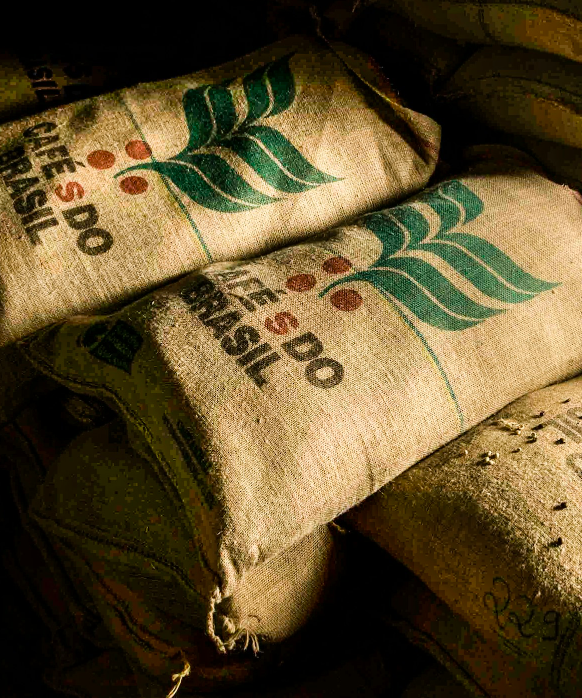It's one of the most widely known facts about coffee: Brazil is the number one producer in the world. Let's unpack a little more of the details...
Words by Katie Burnett

Brazil has been the world’s most significant coffee producing country for decades now. Not only is Brazil the largest single country producer of coffee on the globe, but they also lead the charge in innovation and progressive agricultural practices.
Coffee was introduced to the country in 1727 and it proved to be ideal for coffee crops. With its fertile soil, temperate climate and altitude, it was found that coffee crops thrived in the Brazilian sunshine. In particular, the southeast states on the Atlantic coast. Coffee quickly became the country’s largest export. As coffee production increased all over the country, it became one of the primary stimulants of economic growth and industrialization in Brazil. You can find both arabica and robusta from Brazil, but it is their production of the arabica species that is most significant. Known for lower-acidity, balanced flavour profiles and traditionally has notes of milk chocolate, nuts and caramel, Brazilian coffees are the base of many roastery’s house blends all over the world.
Brazil has also paved the way for innovative, modern coffee production, with many producers investing in modern machinery to make each stage of the production process more efficient:
Weather Forecasting: Analyzing climate data to predict crops and manage risks.
Regenerative agriculture: Techniques that conserve biodiversity and improve soil quality over the long term. (Ineffable Coffee)
In recent years, Brazilian coffee production has been heavily threatened by climate change. Using climate modelling by Gro Intelligence, it found that in most coffee producing municipalities in Brazil the average temperature has increased by 1.2° Celsius, it is predicted that there will be 10 extra days a year of temperatures above 34° Celsius and annual rainfall is expected to decrease by 10%.
In 2020, Brazil experienced an extreme drought that had a massive impact on production as yields declined significantly. In 2021, Brazil faced the worst frost in the last 27 years, ultimately leading to the significant increase of the price of coffee on the Commodity Exchange up until 2025. These extreme, unpredictable weather conditions take a massive toll on the sensitive arabica crop. With extreme weather becoming more frequent, the time between climatic stresses in Brazilian coffee plantations is getting shorter, which means that the plants don’t have a chance to fully recover. The effects of a severe drought in 2020 and the worst frost in 27 years in 2021 are still being felt by the highly sensitive arabica species. (As reported by Mongabay)
Traditionally, there is an extensive use of informal labour in coffee production. Due to the fact that there is typically one harvest annually (some countries will have multiple periods of harvest throughout the year), a large proportion of the employment in coffee production is highly seasonal. In a 2024 study by the Revista de Economia e Sociologica Rural called Between Law and Voluntary Sustainability Standards: A Case Study of Labor Conditions in Brazilian Coffee Production it was found that “in the coffee industry, the opportunity to earn above average wages is rare. In recent years,the average harvest wage has decreased from 3 or 4 minimum wages per month to between 1.5 and 2 minimum wages per month, with only rare instances of skilled workers earning more than 2 minimum wages per month.
A number of interviews were conducted with rural workers as well as labour union representatives as part of the study, some of the prevailing comments were unflattering:
“We have to accept exhausting and risky work because of scarcity of job offers”
“The few options available make us accept lower salaries and have to increase our hours of work to make a living”
In 2021 it was reported that almost 40% of the employed population were employed in the informal sector, meaning that these problems in the coffee industry have a huge impact on the population (Statista, 2025). Additionally, the mechanisation of the coffee industry in Brazil (such as using machines to test and pick cherries instead of using labour), threatens these jobs significantly, as the RESR study provides a rural workers statement “mechanisation reduced and broke the need for our work.”
Still holding the title as the world’s largest coffee supplier, it seems that both labour and mechanisation need to be regulated for the needs of the future population and for the security of global coffee supply. The impact of climate change on this stalwart of the industry also cannot be discounted, as we have seen in the last few years.
.jpg) One of the hallmarks of producing coffee in Brazil is automation. See how the lines of coffee trees are planted for mechanised harvesting. Photo by PROJETO CAFÉ GATO-MOURISCO
One of the hallmarks of producing coffee in Brazil is automation. See how the lines of coffee trees are planted for mechanised harvesting. Photo by PROJETO CAFÉ GATO-MOURISCO